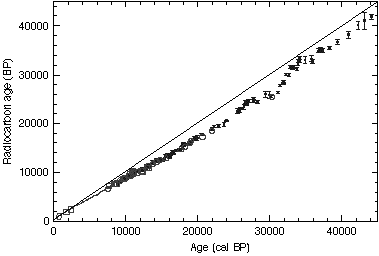We also use many, many other methods, all based on wildly different methodologies, measurements, and premises. And yet, for the most part results of all the differently determined dating methods agree with each other. (And when they disagree, there are well-understood reasons why.) How do you explain this if you believe they are unreliable?
Furthermore, most items of evolutionary interest are *not* dated via "carbon dating", because Carbon-14 dating can only be used for items up to about 50,000 years old. Most items of evolutionary interest have ages measured in millions of years, and other methods are used. Carbon dating is primarily of use for items within the range of human history and early pre-history.
Yet can you answer with certainty the amount of carbon at any given time? As in, were the levels constant? The answer is no.
Very wrong. The answer is yes. There are many, many samples of known age (e.g. tree rings, arctic ice layers, lake bottom layers, etc.) which can be used to multiply and independently determine how much carbon-14 was in the atmosphere in any given year, and thus be used to calibrate Carbon-14 dating methods.
For a quick article on one such study, see http://more.abcnews.go.com/sections/science/dailynews/carbon0220.html
A much more technical treatment: Atmospheric Radiocarbon Calibration to 45,000 yr B.P.: Late Glacial Fluctuations and Cosmogenic Isotope Production
Such studies produce calibration results such as the following:

If the amount of Carbon-14 in the atmosphere had been exactly constant throughout time (and no one expects that it has been), then the results would fall on the straight diagonal line. Instead, the wiggly line indicates how much the actual amount of C-14 in the atmosphere deviated from the "base" amount, and from this we can know how much C-14 was actually present in any given year in the past 50,000 years.
Note that the above graph includes C-14 data from *two* completely independent sources (Lake Suigetsu varves, and ocean corals), and yet the results overlap beautifully, confirming each other. There is similar match from C-14 studies based on tree-ring data and other sources.
From this, we can build a Carbon-14 dating calibration or "correction" curve which can be used to confidently produce an accurate date from a given Carbon-14 measurement. These calibration curves look like this:

There are many databases available which are used to compile massive amounts of data to ensure the proper calibration of carbon-dating. For just one example, Marine Reservoir Correction Database.
Other methods are used to cross-check and calibrate other dating methods to ensure accuracy.
So we can get approximate dates, but relative to how close in terms of the universe?
Quite close.
If we can take a leaf from a tree and date it as being 10,000 years old, yet it was just removed and is still green,
"If"... Feel free to document that this is actually possible.
, then how can we rely on this?
Because the various dating methods give consistent results which have been repeatedly determined to be reliable and accurate.
Science goes out of its way to try to disprove the existance of God.
No, it really doesn't.
More so than to try and prove evolution.
You are extremely mistaken. There are multiple heavy monthly journals which consist of nothing but studies of evolution [one sample]. I can't think of a single article published in any peer-reviewed science journal which even attempted to "disprove the existence of God" (although you might find a few in the Philosophy department).
To deny a "supreme being" without proving "his" non-existance conclusively, is a fundemental error.
So... Since Shiva and Zeus and Odin haven't had their "non-existence conclusively proven", is it a "fundamental error" to deny them as well?
To prove "evolution" wihtout complete proof, such as all missing "links" is also an error.
You misunderstand how science works. Science does not deal in proofs.
However, by your own argument, if it's a "fundamental error" to "deny" something without "proving its non-existance conclusively", then aren't you making a "fundamental error" if you deny evolution without conclusively proving its falseness?
I think your thesis needs a bit more work. Meaning that the evidence, as more is gathered seems in direct contradiction to itself.
Feel free to present your alleged examples.
Leave anit-religious agendas out of science and deal with the facts found. But sadly it seems most science attacks religion
Speaking of agendas...
The Bible if nothing else, has proven things archeologically and including the existance of Peter. His house, and his name carved upon a stone. In the fishing village he was from. When you use the evidence found in the pages of the Bible and things start to add up, more truth upon more truth it is hard to deny the "whole" when the sum of its parts turn out to be real.
History and archeology teach us that the Civil War really happened, there really was a general named Sherman who burned Atlanta, there really were battles at certain places and times, etc., and that there was a woman named Margaret Mitchell. Does this make *all* of "Gone With The Wind" necessarily true?
Science has yet to find life on another planet. Yet they keep trying in this.
Because the only way to find out, *either way*, is to keep looking.
So they seem to have their own faith.
Yes, they have faith in the value of making efforts to keep learning more about the universe we live in.
But have yet to prove it to the world.
Nothing can be "proven" (there's that word again) without information. Science believes in gathering as much information as possible, so that when conclusions are made, they are based on real information, and not philosophical or religious dogmas or "sound-good-isms". And in gathering further information so that past conclusions can be further reality-checked. Science and the scienific method is, in a nutshell, all about doing frequent reality-checks of beliefs.